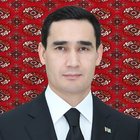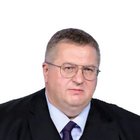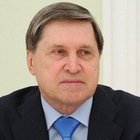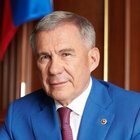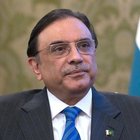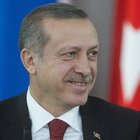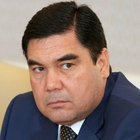Before the meeting, President of Turkmenistan Serdar Berdimuhamedov held a welcome ceremony for the heads of delegations attending the international forum.
The Russian delegates attending the event included Deputy Prime Minister and co-chair of the Russian-Turkmen Commission on Economic Cooperation Alexei Overchuk, Deputy Chief of the Presidential Executive Office and Presidential Press Secretary Dmitry Peskov, Presidential Aide Yury Ushakov, Ambassador Extraordinary and Plenipotentiary to Turkmenistan Ivan Volynkin, and Head of the Republic of Tatarstan Rustam Minnikhanov.
Vladimir Putin had a brief conversation with President of Pakistan Asif Ali Zardari on the sidelines of the forum. The leaders exchanged mutual invitations for official visits to Russia and Pakistan, respectively, and confirmed their countries’ intention and political interest in strengthening bilateral ties across all areas.
Vladimir Putin also talked with Speaker of the Turkish Parliament Numan Kurtulmus and reaffirmed that he was looking forward to meeting with President of Turkiye Recep Tayyip Erdogan at the BRICS summit in Kazan.
* * *
Address by the President of Russia
President of Russia Vladimir Putin: Mr Berdimuhamedov, ladies and gentlemen, friends,
The Interrelation of Times and Civilisations – Basis of Peace and Development international forum, dedicated to the 300th birth anniversary of the outstanding Turkmen thinker, philosopher poet and public figure Magtymguly Pyragy, is of great importance today.
See also
Magtymguly Pyragy is rightfully regarded as a great humanist and the founding figure of Turkmen poetry and literature, with his creative legacy forming an integral part of the world's greatest cultural treasures.
Magtymguly was one of the first to reveal the beauty of the Turkmen language in all its diversity and richness. He had a unique poetic style, expressing thoughts concisely, but with a depth of meaning and aphoristic clarity. Many of his poetic lines became popular catchphrases – aphorisms, proverbs, and sayings. Magtymguly’s books were not only read, they were kept at home as sacred relics.
There is something I would like to highlight: during the Second World War — or, as it was known in the Soviet Union, the Great Patriotic War, relatives of Turkmen soldiers would quote his poems in their letters sent to the frontlines, trying to reassure the warriors and inspire courage and valour. I will quote one of those phrases for you: “All our tribes are marching under the righteous banners from all sides.”
Magtymguly’s works have been translated into Russian. It is reliably known that the poet actually lived for a long time in the village of Funtovo near Astrakhan. The area has been densely populated by Turkmen diaspora groups since the late 17th century to the present day. In 2019, a school built there at Gurbanguly Berdimuhamedov’s initiative was named after Magtymguly. Astrakhan has a monument to Magtymguly; in September, a bust of this outstanding poet was unveiled in Moscow.
Far ahead of his time, Magtymguly never halted his creative and spiritual search and always strove for knowledge and truth. Due to his genius, he was able to anticipate the future of his land and people. In his works, Magtymguly invariably called for purity, justice and equality, not only in relations between individuals, but also between states and nations. A visionary thinker, he advocated the high ideals of friendship and good neighbourliness, and tried to convey these thoughts to future generations, calling for harmony and responsibility, tolerance and understanding, respect and solidarity.
This message remains relevant and meaningful to reasonable people today, and it holds even greater significance amid the current global challenges, when unprecedented threats stem from civilisational divides and ethnic and religious conflicts. International relations have entered an era of profound transformation, and a new world order is emerging that reflects the world's diversity. This process is inevitable and irreversible.
Emerging powerful centres of economic growth, financial, and political influence are increasingly evident, particularly within the Global East and the Global South at large. These newly established centres are committed to preserving and strengthening their sovereignty and socio-cultural identity, while pursuing harmonious development in accordance with their traditions and based on national interests.
In the spirit of Magtymguly's philosophical views, the global majority nations, which both Russia and every other country participating in this forum are part of, advocate for a more equitable distribution of wealth and the consistent democratisation of the international landscape. We firmly believe that universal peace and comprehensive development can only be achieved if every nation's views are taken into account and every state's right to have its own sovereign policy, worldview, traditions, and religious beliefs is respected.
I’d like to emphasise that Russia endorses the broadest possible international dialogue concerning the parameters of interaction in our emerging multipolar world. It is open to discussing the establishment of a new world order with all our friends, partners, and like-minded people, including within the frameworks of the CIS, the EAEU, the Shanghai Cooperation Organisation, and BRICS.
In this context, we are preparing for the forthcoming BRICS and BRICS Plus/Outreach format summits scheduled to be held in Kazan from October 22 to 24. We would most certainly welcome our host, Mr Berdimuhamedov, along with many other leaders attending this forum, to join us at the events in Kazan.
Before concluding, I would like to take this opportunity to extend special gratitude to the current leadership of Turkmenistan – the President and the national leader of the Turkmen people, Gurbanguly Berdimuhamedov – for their commitment to the principles articulated by Magtymguly and their significant contribution to maintaining peace and stability in our shared region, as well as to expanding multifaceted cooperation and partnership.
Thank you for your attention.











